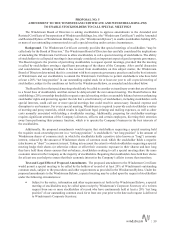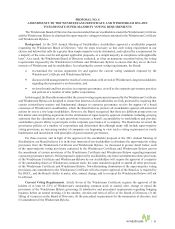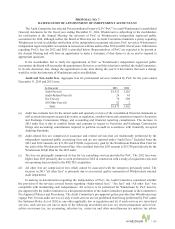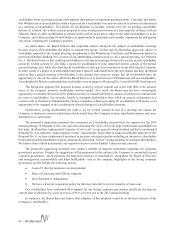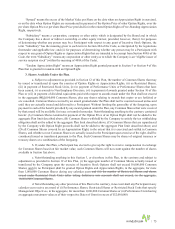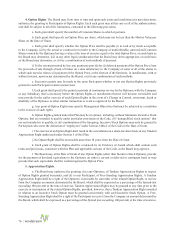Windstream 2013 Annual Report Download - page 73
Download and view the complete annual report
Please find page 73 of the 2013 Windstream annual report below. You can navigate through the pages in the report by either clicking on the pages listed below, or by using the keyword search tool below to find specific information within the annual report.
| 67
PROPOSAL NO. 9
STOCKHOLDER PROPOSAL TITLED:
Right to Act by Written Consent
The stockholder proposal, which follows, is a verbatim submission by Kenneth Steiner (who has notified
Windstream that he is the beneficial owner of Windstream Common Stock valued at more than $2,000), whose
address is 14 Stoner Ave., 2M, Great Neck, NY 11021, for consideration by Windstream stockholders. All statements
therein are the sole responsibility of the Mr. Steiner.
Stockholder Proposal
Resolved, Shareholders request that our board of directors undertake such steps as may be necessary to permit
written consent by shareholders entitled to cast the minimum number of votes that would be necessary to authorize
the action at a meeting at which all shareholders entitled to vote thereon were present and voting. This written consent
is to be consistent with giving shareholders the fullest power to act by written consent in accordance with applicable
law. This includes shareholder ability to initiate any topic for written consent consistent with applicable law.
Wet Seal (WTSLA) shareholders successfully used written consent to replace certain underperforming
directors in 2012. This proposal topic also won majority shareholder support at 13 major companies in a single year.
This included 67%-support at both Allstate and Sprint.
This proposal would empower shareholders by giving them the ability to effect change at our company without
being forced to wait until an annual shareholder meeting. Shareholders could replace a director using action by
written consent. Shareholder action by written consent could save our company the cost of holding a physical meeting
between annual meetings.
A previous shareholder proposal was approved over the Windstream board’s opposition with 52% support from
shareholders. It called for Windstream to change its charter and bylaws so that all proposals will require a simple
majority vote of shareholders rather than the supermajority that certain changes currently require. Our CEO Jeffrey
Gardner said our board would begin working on implementation of the change at its August meeting and would put
specific changes to the shareholders for a vote next spring - according to Arkansas Business, May 8, 2013.
This proposal should also be more favorably evaluated due to our Company’s clearly improvable environmental,
social and corporate governance performance as reported in 2013:
GMI Ratings, an independent investment research firm rated our company D for its executive pay. Windstream
could give long-term incentive pay to our CEO for below-median performance. Unvested equity pay would not lapse
upon CEO termination. Our company had not incorporated links to environmental or social performance in its
current incentive pay policies and there was the potential for excessive golden parachutes.
Our Chairman, Jeffrey Hinson, was potentially over-committed with seats on 4 company boards. Not one
independent director had general expertise in risk management. GMI said there were forensic accounting ratios
related to asset-liability valuation that had extreme values either relative to industry peers or to our company’s own
history. GMI rated Windstream as having Very Aggressive Accounting & Governance Risk. This indicated higher
accounting and governance risk than 97% of companies.
Returning to the core topic of this proposal from the context of our clearly improvable corporate governance,
please vote to protect shareholder value:
Right to Act by Written Consent - Proposal 9
Board of Directors’ Statement in Opposition
The Windstream Certificate specifically prohibits stockholder action by written consent. The Board strongly
believes that important matters should be the subject of stockholder meetings, which provide the opportunity for
discussion and interaction among the Company’s stockholders so that all points of view may be considered prior
to a vote. Because stockholder action by written consent does not require advance notice or communication to all
stockholders, it would deprive stockholders of the opportunity to discuss, deliberate and vote on pending stockholder
actions, thereby causing the disenfranchisement of potentially significant numbers of stockholders, and may prevent




